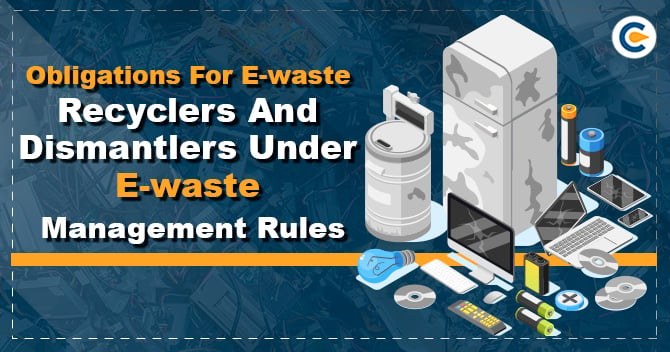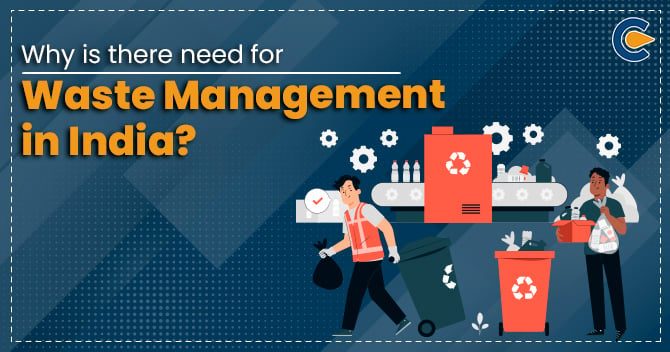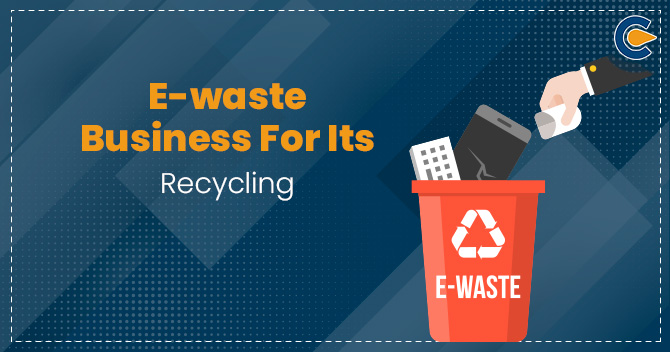Dismantlers and recyclers under E-waste management rules are vested with a long list of obligations to minimize the adverse effect of e-waste. This article shall explain the obligations of e-waste recycler and Dismantler as provided under E-waste management rules, 2016.
Obligations of E-waste recyclers under E-waste management rules
- E-waste Recyclers under EWM Rules must abide by the CPCB’s provisions relating to Recycling processes.
- E-waste Recyclers under EWM Rules have to apply and thus obtain authorization from respective SPCB in pursuant to the procedure cited under sub-rule (3) of rule 13
- Every recycler should store and transport e-waste in an eco-friendly manner.
- Every recycler should aheres to norms for inspection conducted by the officials of SPCB or CPCB. They are also accoutable to facilitate records to such officials whenever prompted.
- Any material not subjected to the recycling process should be sent to the certified recycler.
- Any quantum of residue generated via ecycling process should be disposed of in a certified treatment storage disposal centre.
- Every recycler is liable to maintain records concerning e-waste collected, dismantled, recycled and sent to the certified recycler in form-2. Said records can be subjected to the inspection performed by SPCB’s officials.
- Every E-waste recycler is mandated to file an annual return via form-3 with the respective SPCB on or before June 30 following the FY to which such return relates.
- Procurement of waste electrical goods or component is permissible provided such wastes do not contain any radioactive material. Recyclers intending to procure such waste need to intimate SPCB and thereafter secure authorization for the same in the first place.
- Securing Authorization from SPCB is a must-have requirement for the E-waste recycler. Performing recycling undertakings without such authorization shall incur penalties for the defaulting entities operating as recycling units.
Obligations of E-waste Dismantler under E-waste management rules
- Dismantlers under EWM Rules must abide by the provisions set out by Central Pollution Control Board relating to dismantling processes.
- Dismantlers under EWM Rules have to apply and thus obtain authorization from respective SPCB in pursuant to the procedure cited under sub-rule (3) of rule 13
- Every Dismantler should store and transport e-waste in an eco-friendly manner.
- Every Dismantler should ensure apt segregation of e-waste. Post segregation, Dismantler should send the e-waste to the certified recycling units for recovery of valuable materials.
- Certified dismantlers are mandated to send non-recyclable components to the certified disposal and treatment storage units.
- Dismantlers are liable to manage records concerning e-waste collected, dismantled & mobilized in form-2 and make such records accessible for inspection to SPCB.
- Every Dismantler is mandated to file annual returns via form-3 with the respective SPCB on or before June 30 following the FY to which such return relates.
- Certified dismantlers cannot process any e-waste for refining or recycling of materials in the absence of SPCB’s authorization.
Amendments in EWM Rules 2016
GOI had promulgated the revised E-Waste Management Rules 2016[1] on March 22, 2018. The revision of certain provisions under the said rules was done to mobilize the E-waste generated towards the certified dismantlers and recyclers to formalize the e-waste recycling sector.
The collection targets under the direction of EPR in the rules have been amended & targets have been revised, and targets laid out for new producers who have commenced their sale undertakings lately.
Some of the key highlights of the E-waste (Management) Amendment Rules, 2018 are mentioned below:
- The target for e-waste collection under extended producer responsibility has been revised and shall be applicable from October 1 2017. The stage manner collection targets in weights shall be 10 per cent of the quantity of waste generation as cited in EPR Plan during 2017-18, with a 10 per cent increase every year until 2023. Post-2023, the collection target has been made 70 per cent as indicated in the EPR Plan.
- The quantity of e-waste accumulated by producers from October 1, 2016, to September 30 2017, shall be accounted for in the amended EPR targets unit March 2018
- Individual targets for e-waste accumulation have been rolled out for those producers whose no. of years in sales is less than the average service life of their products. The average service life of the products shall be as per the directions rolled by CPCB from time to time.
- Producer Responsibility Organizations shall apply to CPCB for registration to perform tasks mentioned in the Rules.
- Under the RoHS i.e. Reduction of Hazardous Substances norms, cost for sampling & inspection shall be addressed by the government for executing the RoHS test. If the product does not adhere to RoHS norms, then the testing’s cost shall be addressed by the producers.
Conclusion
The continual increase in E-waste is a pressing issue for the government. GOI is making a constant effort in minimizing the environmental hazard caused by e-waste. E-waste alleviation in India has forced the government to enact the legislation known as E-waste management rules, 2016. The said legislation seeks to vest entities (be it producer, recycler or Dismantler) with certain responsibilities to prevent the massive generation of e-waste via proper management.
Read our Article:EPR Target in E-Waste Management: Meaning, Significance and Obligations











